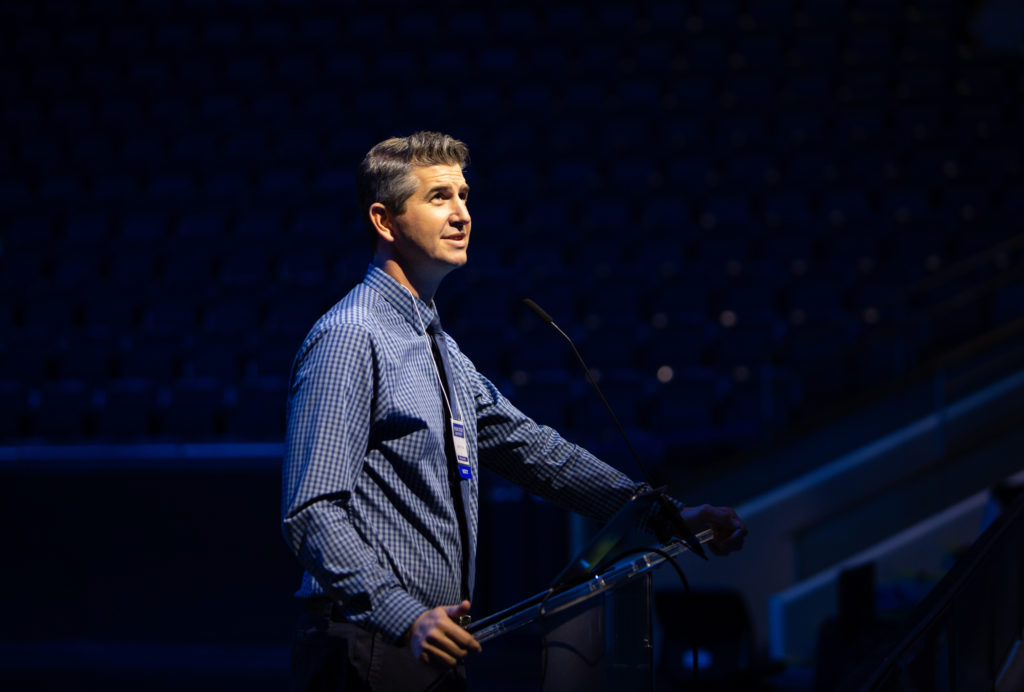
BYU Church history and doctrine professor Anthony Sweat talked during an Education Week session on Wednesday about sustaining the prophets despite the imperfections one might see in them or disagreements one might have. He said disagreeing with the prophet is not the same thing as disloyalty, but efforts to sustain the prophet should never falter.
“It has been said that that the greatest test of every generation is how they respond to the voice of living prophets,” Sweat said. He added that the question, “How do we sustain modern yet mortal prophets?” is perhaps one of the most important questions we can ask.
Sweat talked about the uniqueness of having a living church that receives continual revelation and is ever-changing, but said there are some unique problems that arise because of it. The Church is always changing, he said, and some interpret such change as corrections to previously incorrect practices or views, while some others view such changes as the Church caving in to pressures.
Sweat gave an example of a practice in Church history that changed. He said that in the early days of the Church, before endowments and sealings for the dead had been revealed, members of the Church still saw a need for joining together the family of God through sealings. They didn’t have the means to link the generations vertically, so they instead conducted sealings horizontally. As an example of this, Sweat said Brigham Young was sealed to Joseph Smith as his son. Such “adoptions” produced some uncertainty, and some members disagreed with the custom, including Wilford Woodruff.
Sweat said that when Wilford Woodruff later became President of the Church, he received revelation that every man should be sealed to his father and not to “any other man outside the lineage of his fathers.”
This drastic change, Sweat said, can be compared to the more recent change in Church policy regarding baptisms and blessings for children of LGBTQ parents.
Sweat said that for some members, this creates a problem. They view the original practice as wrong and think, “I can’t sustain the prophet if they were wrong on this. What else are they maybe wrong about today?”
Sweat said there is nothing wrong with such questions, but it’s better for one to adjust their approach and look instead at how they can sustain modern, yet mortal prophets.
Sweat quoted several prophetic voices of this dispensation such as Presidents Brigham Young, Wilford Woodruff and M. Russell Ballard. Each of them said that the President of the Church would not and could not lead its members astray.
He also quoted Elder Neil L. Andersen, Elder Jeffrey R. Holland and Elder Dieter F. Uchtdorf, who all said that leaders of the Church are all imperfect and make mistakes.

Pulling from an example in Church history, Sweat said that the first recorded revelation of this dispensation was section 3 of Doctrine & Covenants. In this section, Joseph Smith was rebuked by God for losing 116 pages of the transcript of The Book of Mormon. This first recorded revelation, Sweat said, clearly showed the imperfection of a prophet. Sweat joked that section 3 was a testament of sorts to the fact that Joseph Smith really was a Prophet. “False prophets don’t walk around writing revelations like section 3,” he said.
Sweat said there is a great difference between a prophet making mistakes and leading others astray. Sweat said his children would readily admit that their parents make mistakes, but he’s confident they would say they are not being led astray.
Prophets have made mistakes in the process of trying to administer and understand some ordinances, Sweat said. There are things to correct and fix, and there is new knowledge to gain, but the prophets could not purposely lead God’s children away from Him. Church members can continue to sustain them despite their imperfections.
Everyone has their own imperfections, he added, pulling from a quote by Elder Jeffrey R. Holland, which said, “Except in the case of his only perfect Begotten Son, imperfect people are all God has ever had to work with. That must be terribly frustrating to him, but he deals with it. So should we.”
Sweat went on to say that there is not just one way to sustain the prophets and suggested many ways in which members can go beyond raising their hand in a sustaining vote. These suggestions included studying the prophets’ words, praying for them, defending their reputation when necessary, following prophetic priorities and fulfilling Church callings.
Sweat also said there is room for disagreeing with the prophet that doesn’t necessarily conflict with sustaining him. Recalling his earlier analogy, Sweat said his children can disagree with him and still love and support him.
Sweat said he himself had served 10 years with the Young Men’s organization and spent a great deal of time helping young men get their Eagle Scout awards in Boy Scouts. He said that if one would have asked him if he liked the Scouting program before he received his calling, he would have responded, “No.” He said he didn’t think the program best fulfilled the needs of young men in the Church. But when the calling was extended to him, he served loyally and offered his best efforts, he said.
It’s perfectly reasonable for members to have their own views that don’t entirely align with those of the prophet, Sweat said, but a problem arises when members attack the character of the prophet or take that disagreement to the extreme of open rebellion or opposition.
“We can be in solidarity with and defend prophetic keys, even if at times we don’t agree with or can’t understand a particular prophetic teaching,” Sweat said, adding that it can take a great deal of humility to do so.




